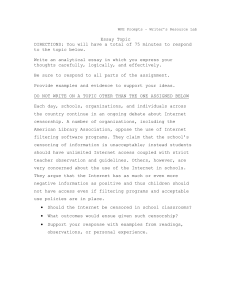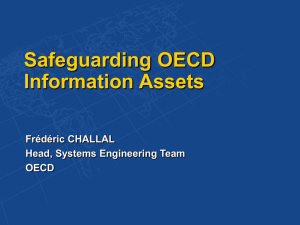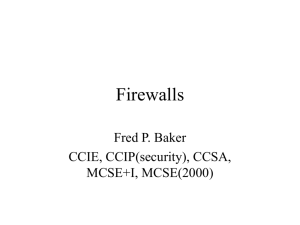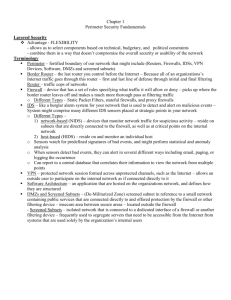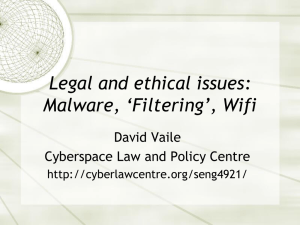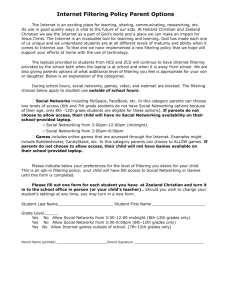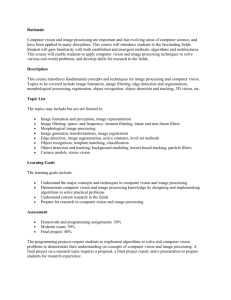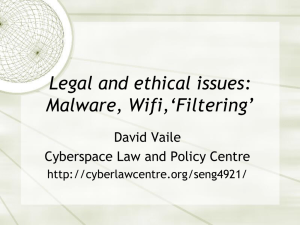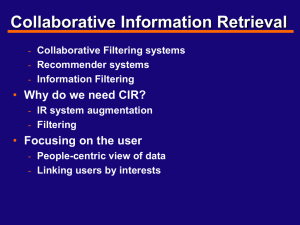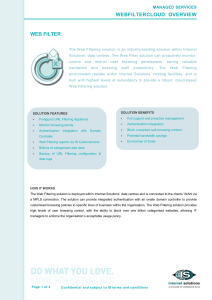Censoring Internet: Problems and Approaches Issues
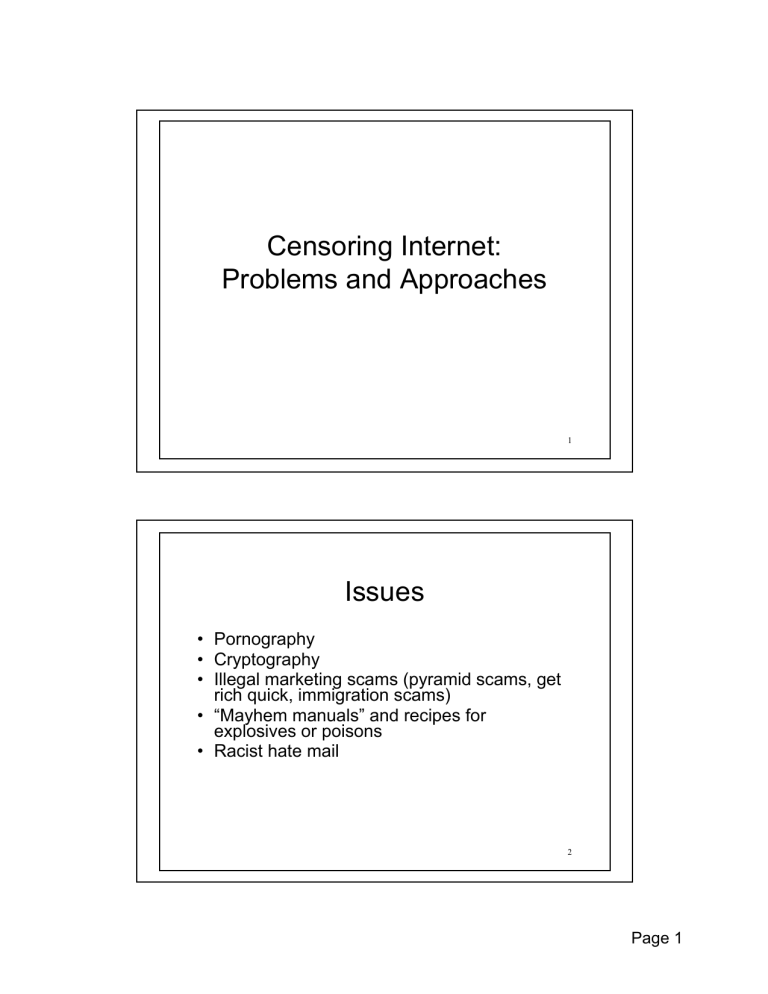
Censoring Internet:
Problems and Approaches
1
Issues
• Pornography
• Cryptography
• Illegal marketing scams (pyramid scams, get rich quick, immigration scams)
• “Mayhem manuals” and recipes for explosives or poisons
• Racist hate mail
2
Page 1
Technologies: Address
Filtering
• Address filtering
– Maintain a list of known good sites
– Maintain a list of known bad sites
– Apply filtering in a router to permit or deny
• Pro:
– Very transparent
– Commercial routers have good screening abilities
– Minimal development effort required prior to deploying
3
Technologies: Address
Filtering
• Con:
– Routers may not be able to cope with large lists
(tens of thousands or hundreds of thousands)
– Spotty interruptions of service may result when users hit banned sites
– Granularity of control not sufficient
• Banning sites by address may mean desirable pages are unreachable because of co-hosted pages with offending content
• Banning specific pages is impossible with a router
4
Page 2
Technologies: Firewalls
• Firewalls:
– Use some kind of application relay technology running on a firewall host
• Pro:
– Excellent audit trail
– Easy to modify and scale system (buy more RAM, disk, and processor power)
– May be a good spot to add caching for Web performance or FTP service
– May help keep hackers out (are there hackers in
Singapore?)
5
Technologies: Firewalls
• Con:
– May be a serious performance bottleneck
– May (depending on implementation) not be transparent
– May not scale
• Nobody that I know of has tried to firewall off an entire country before
• Most UNIX machines cannot support 10,000 users
– Slow to adapt to new technologies and services
– Can a complete national-level security perimeter be enforced?
6
Page 3
Technologies: Client Filtering
• Client Filtering:
– Maintain a list (or online database) of sites that client software should not allow operation with
– “desktop firewall”
– SurfWatch technology approach
• Pro:
– Performance scales to large installations
– Does not require expensive routers and network infrastructure redesign
– Easy to use and update
– Transparent
7
Technologies: Client Filtering
• Con:
– SurfWatch problem: customers buy the service to get a list of where to find good porn!
– Online list database can potentially grow very large
– Users can easily tamper with the web browser software and modify lists
• Or download netscape
– What prevents someone from simply writing their own web browser?
8
Page 4
Problems of Scale
• 500 new web sites added every minute
• Each site has many pages
• List-based censorship becomes a full-time job for dozens of staff
• Many URLs change daily or hourly
• Many URLs are dynamic and return different data each time they are queried
9
2 Different Approaches
• Proactive
– Never let the stuff through
– Be there first
– Almost forces a “deny everything except what we’ve checked out” policy
• Reactive
– Assume something will get through
– Be prepared to detect it and shut it down
– Permits a more flexible policy
10
Page 5
Proactive Censorship
• Requires that you read everything manually
– And there’s a LOT of content out there!
• Requires some policy for updates to permitted content database
• May be “mistake proof” by being extremely conservative
• If less conservative, mistakes will happen
11
Reactive Censorship
• Perform traffic/size analysis and correlation
– Search for large image transfers from sites that appear often
– Flag them for examination
– If the examination reveals contraband material then shut the site (or URL) off
• Problem:
– A piece of software cannot distinguish a .GIF
image of a sea otter from a .GIF image of a naked human
• Humans still required for observation
• Can use (transparent) non-intrusive monitoring
12
Page 6
What About Collusion?
• What if someone Emails to someone: “send me a UUencoded tar of pornography?”
• What about services such as FTPmail?
– Email to an address and it will FTP a file for you and Email the data back
• There are outgoing services also that let people inside do things like post to USENET, etc., via Email
– anon.penet.fi news gateway (and many others)
13
What About Broadcast Media?
• USENET news:
– Many newsgroups some with acceptable and some with unacceptable content
– No enforcement of posting rules
– In the past people have posted porn .GIF files to rec.pets.cats
as a way of getting around local site policies at universities
• MBONE:
– Free-form video (including alternative video)
• IRC:
– Free form discussion channels (including adult topics and hacking techniques)
14
Page 7
What about Encryption?
• Encrypted data cannot be examined for appropriateness of content
– Singapore may have legal recourses here that US does not
• Encrypted data in some cases is easy to detect
• Tools exist for hiding encrypted data within normal-looking text or Email or .GIFs
• These technologies scare the US Gov’t a lot
– US law vis-a-vis privacy makes it difficult for government to act on cryptography
15
Some Options: Technical
• For most conservative approach a firewall is best
• Collusion makes it easy to get around a firewall if you want to badly enough
• This is a case of “you can’t solve social problems with software”
16
Page 8
Some Options: Judicial
• Is it possible to monitor traffic passively and enforce the law?
– Requires legal decisions and a cryptography policy
– Requires public awareness of acceptable use and issues
– Requires monitoring/reaction staffing
• What is the requirement for conservativeness?
– How strictly is the law to be enforced?
– How reliably is the law to be enforced?
17
Conclusions
• No solution likely to make everyone (or even a majority) of people happy
• In the end it boils down to enforcement
• Can you make people follow the law?
– In US, drug laws are widely flaunted
– Government enforcement not reliable but very strict
– Compliance with law directly relates to how reliable punishment is rather than how strict the punishment is
18
Page 9
